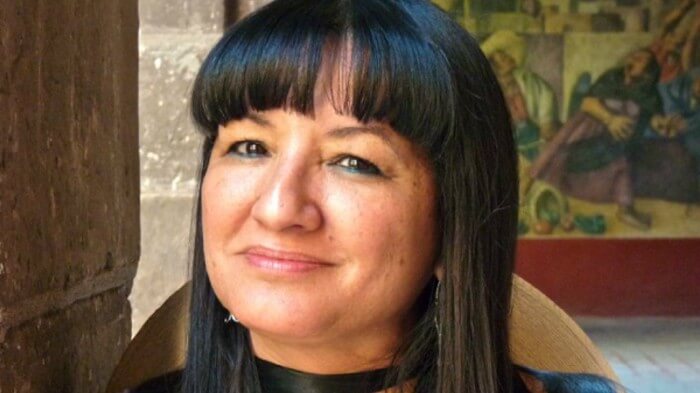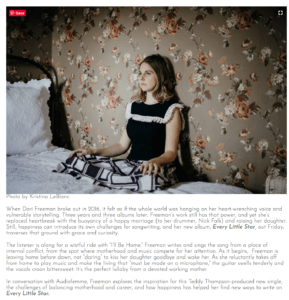
Published on Amy Poehler’s Smart Girls.
Mexican-American writer Sandra Cisneros strives to live her most authentic life—her “life of letters.” She is the author of several books, namely of the award-winning novel, The House on Mango Street. Later this year, she’s releasing a collection of true stories from her own life called A House of My Own. But her prolific career would’ve been impossible, Sandra says, if it hadn’t been for the Chicago winter of ‘66.
“Frozen pipes changed my life…” Sandra reflected on her time in Catholic School from her home in Mexico, “We started school with… this wonderful nun, the sort of nun who would jump rope with you,” she said. “Then we moved to a new school where we were the bottom poor kids…[the nuns and students] gave me a sense of nothingness,” she said.
In the exceptionally cold winter of ’66 the pipes of the Cisneros’ house froze. They were left with only the water they could collect in jars. Sandra’s fed-up father was then forced to moved them again, and the whole experience was formative for Sandra. “That was my education. Changing from the neighborhood where we were the despised other to this new place where suddenly everyone was poor. We were no longer ‘The Untouchables,’” she said.
Sandra learned at a young age what it was like to be scrutinized and excluded because of what made her different, like her Mexican-American heritage. But it wasn’t until graduate school at the prestigious Iowa Writer’s Workshop that she really realized her differences were a powerful gift.
“[At Iowa,] I felt like every time I spoke people looked at me like I was the biggest dork. It was horrible and I hated it… there was such a culture of superiority instilled there…when people spoke it was always like they were scaling some sort of mountain and trying to get to the top.”
Sandra was miserable in the program’s competitive environment and learned how to survive by shutting down and staying quiet. Deeply depressed, she sought other ways to keep her spirit afloat. She studied dance in the greater community and shadowed ceramics students. Also, she started to write The House on Mango Street.
“[I remember thinking,] ‘You mean everyone doesn’t go to Mexico to visit their domineering grandmother? What? You mean I’m the only one who had to give away my baby brother?’” she said, “It’s those things that you take for granted and think are everyone’s life that are your gift… Once I started finding that I could write from a place where none of my classmates could write from, that forced me to find my voice.”
Not surprisingly, the voice she found was one that hadn’t been heard before. In 1984, she published The House on Mango Street and it went on to win the American Book Award. To this day, the coming of age story about young Esperanza continues to be widely read and taught as an emblem of the Mexican-American experience.
On Mango Street‘s success she said, “It confirms to me a spiritual lesson that when we do work on behalf of others, with no personal motive, when we do work from the heart and our intuition it will take us on our path, to a place that’s full of light.”
Sandra continues to live and create by the philosophy, spreading light, working from the heart, and striving to be of service. For instance, one of her most recent projects is a Day of the Dead altar installation for her mother. It’s been all over the country, even at the Smithsonian.
“My mom let me have my life of letters … She was the most angry, frustrated, drafted-into-motherhood mom. She didn’t want that for me so she liked to give me choices. She always allowed me to read books and not work in the kitchen…My friends were changing diapers, and I still, to this day, can’t even cook,” Sandra said, “[My mother] would tell me to watch the rice and I’d watch it burn.”
Sandra’s mother’s progressiveness paid off, for Sandra says she’s happier than ever and living a life where she gets to call her own shots. “Why is it a bad thing when something is feminist? Don’t you want your daughters and wives to be empowered so they aren’t ashamed? Women having control over their futures, why is that a bad thing?,” she said.
Still, her art-devoted life hasn’t come without its struggles. She’s worked odd jobs and lived in garage apartments in towns she didn’t want to live in. She’s also contended with bouts of severe depression. “I went to near death in a suicidal year when I was 33 and that’s what taught me that it’s really important to have a therapist or a spiritual teacher or a healer or a sweat lodge…you have to have something grounding to guide you. We can be disconnected from those communities that can enlighten and support us,” she said.
Sandra recommends you seek out your “peeps!,” the people that understand you, like those of us at Smart Girls. “[Women] are so cluttered with what people want us to be, with a “true” woman is. Especially in my 20’s, I cried every week. I called them “My disastrous 20’s.” I was always thinking, am I on the right path?…You need to find other woman [like you]. They will become your spiritual family.”
Sandra Cisneros’ newest book, A House of Her Own: Stories From My Life, is due out later this year. For more information on the forthcoming book and others she’s released, please visit Sandra’s website.





